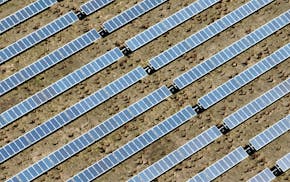Opinion editor's note: Strib Voices publishes a mix of guest commentaries online and in print each day. To contribute, click here.
•••
The Minnesota Rural Electric Association (MREA) and Minnesota Municipal Utilities Association (MMUA) are desperately trying to convince Minnesota legislators that our state's first-in-the-nation net metering law is outdated and unfair ("Minnesota is clinging to an outdated net metering system for solar," April 16). In reality, what is outdated is the utility business model. The reason utilities oppose net metering is simple: Every kilowatt-hour of energy they don't produce is one they can't profit from. Naturally, they'll do whatever it takes to change longstanding policy that empowers Minnesotans to own their energy production. This isn't merely a dispute between clean energy and solar advocates and electric utilities. This is a disagreement about the energy transition, and a fight for the people of Minnesota.
Here's the truth about net metering: Any power produced by a small solar array is first consumed by the homeowner, small business or farmer who installed it to supply their own needs. Then, if there is any extra, that power goes on to the grid, flowing to nearby power users and generating a credit for the small solar owner. For the utility, this is an economic wash — the credit is equal to the income the utility generates for selling the small solar owner's extra power.
Currently, all Minnesotans have equal rights to offset their energy needs through small solar arrays under 40 kilowatts. MREA and MMUA want to change that by giving rural Minnesotans a worse deal than their urban counterparts. In some instances, they propose crediting rural solar owners for power they produce at approximately two cents per kilowatt-hour — even though they would turn around and sell that power for up to $0.12/kWh. This is a 600% profit on power the utilities paid nothing to produce.
Studies have shown that when more distributed generation like small solar arrays are added to the electricity grid, reliability and cost efficiency increases for everyone. But currently in our state, virtually all utilities have small scale solar penetration rates of just 1% or less. Despite such low penetration rates, and the clear benefits of distributed generation to the electricity grid, MREA and MMUA keep claiming that net metering places unacceptable financial burdens on non-solar customers — with no data to support these claims.
We have seen the negative impact that poorly thought-out changes to net metering can have on the growth of distributed generation technologies like small solar. In California, where the 30% penetration of distributed generation was light years ahead of Minnesota's meager 1%, the solar energy industry shrank by over 80% overnight when regulators ignored the public and listened to monopoly utilities and kneecapped the state's net metering policy. This resulted in the loss of tens of thousands of jobs, hundreds of millions of dollars in private investment and billions of dollars in long-term savings for energy consumers. We must not go down that path in Minnesota.
The rural utility business model was developed over a century ago. Rural electrification efforts led to utility models that centralized energy generation. Today, that model remains unchanged and unchecked, despite a technological shift that enables all Minnesotans to share in the economic benefits of energy production. Change is hard, so is achieving progress. That helps explain why utilities are fighting so hard to preserve an outdated model that benefits their risk-free revenue streams and disincentivizes innovation.
Net metering is a policy that allows Minnesotans to take control of their energy needs, while making our grid more reliable and sustainable. Customer-produced solar electricity is generation we need now more than ever. By investing in solar on the local distribution grid, Minnesotan households and businesses minimize electricity transmission losses, create local jobs and make the energy system more resilient. The projects that cooperative and municipal utilities are now attacking generate long-term benefits to our communities and all energy consumers. Minnesota's first-in-the-nation net metering program is simple, fair and effective — and with big goals for accelerating clean energy deployment, we should be using every tool available, not clinging onto an outdated utility model that benefits monopolies instead of Minnesotans.
Logan O'Grady is the executive director of the Minnesota Solar Energy Industries Association, a nonprofit trade organization representing more than 170 companies involved in solar and energy storage development. Bobby King is Minnesota state director for Solar United Neighbors, a nonprofit advocating for solar owners and energy democracy. Patty O'Keefe is the Midwest regional director of Vote Solar, a nonprofit working at the state level to make solar power accessible to all.
Opinion: Could Walz still follow through on 'One Minnesota'?

Counterpoint: Net metering of solar power is not outdated

Opinion: Should America's antidiscrimination laws be repealed as outdated?
Olson: Pete Hegseth has no business at the Pentagon

